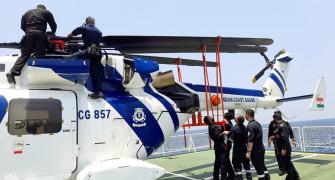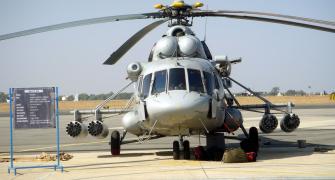The Philippines is looking at procuring a batch of advanced light helicopters from India to crank up its combat capability, months after sealing a $375 million deal to acquire three batteries of the BrahMos cruise missile.

The Southeast Asian nation has been focusing on modernising its military in the face of myriad security challenges as well as decades-long territorial disputes with China in the South China Sea.
Top officials in the security and defence establishment told PTI on Sunday that the Philippines has shown keen interest in procurement of a significant number of advanced light helicopters (ALH) to replace its ageing chopper fleet.
It is learnt both sides are holding talks on the proposed acquisition and there has been 'positive' movement in the negotiations.
The indigenously developed ALH helicopter is a twin engine, multi-role, multi-mission new generation helicopter in the 5.5 ton weight class and is considered to be an effective platform for various military operations.
The officials said the Philippines has also been impressed by the performance of India's indigenously-developed Tejas light combat aircraft and could consider procuring it as the country continues its hunt for a fleet of fighter jets.
The Philippines is a key strategic partner of India in the Southeast Asian region and the bilateral defence and security ties have been on an upswing in the last few years, especially in the maritime domain.
The Philippines is also a key member of the 10-nation Association of Southeast Asian Nations (ASEAN), an influential bloc with whom India's ties have witnessed major expansion in the last one decade.
In January, the Philippines concluded a $375 million deal with India for procurement of three batteries of the BrahMos cruise missile.
BrahMos Aerospace, an India-Russian joint venture, produces supersonic cruise missiles that can be launched from submarines, ships, aircraft, or land platforms.
In a related development, India signed a framework agreement with the Philippines in March that provided for government-to-government deals for supply of defence hardware and equipment.
India has been looking at supplying critical military hardware and platforms to countries with whom it has strong strategic ties and convergence of interests.
The Tejas aircraft has already emerged as the top choice for Malaysia as the country is looking at replacing its ageing fleet of fighter jets.
Malaysia has already narrowed down on the Indian aircraft notwithstanding stiff competition from China's JF-17 jet, South Korea's FA-50 and Russia's Mig-35 as well as Yak-130.
Tejas, manufactured by Hindustan Aeronautics Ltd, is a single-engine and highly agile multi-role supersonic fighter aircraft capable of operating in high-threat air environments.
In February last year, the defence ministry sealed a Rs 48,000 crore deal with HAL for the procurement of 83 Tejas fighter aircraft for the Indian Air Force (IAF).
India has already started work on the MK 2 version of the Tejas as well as on an ambitious USD 5 billion project to develop a fifth-generation Advanced Medium Combat Aircraft (AMCA).
The sources said India is also keen to set up an MRO (Maintenance, Repair and Overhaul) facility in the Philippines to provide services to its civil and military aircraft.
"The talks on several projects are underway," said one of the officials.
It is learnt that a number of other countries in Southeast Asia as well as the Gulf region have shown interest in procuring critical military platforms from India.
India's defence and security ties with majority of the countries in the Gulf region and Southeast Asia have been on an upward trajectory in the last few years.
India is also in talks with many of them for co-production and co-development of military hardware as part of overall efforts to forge stronger strategic ties and boost the domestic defence production.
The Defence Ministry has set a goal of a turnover of $25 billion (Rs 1.75 lakh crore) in defence manufacturing in the next five years that included an export target of $5 billion (Rs 35,000 crore) worth of military hardware.
In the last few years, the government has taken a series of measures to promote domestic defence production.










